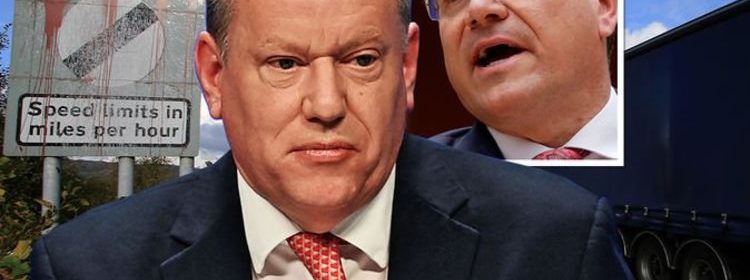Why UK won’t stand down in EU row – and could trigger Article 16 any day

Northern Ireland may become 'serious problem' warns Rogers
We use your sign-up to provide content in ways you’ve consented to and to improve our understanding of you. This may include adverts from us and 3rd parties based on our understanding. You can unsubscribe at any time. More info
The UK is seriously considering suspending parts of the Brexit deal for Northern Ireland as it finds itself in a tense standoff with the European Union. Members of the British Government have said triggering Article 16 has been a serious possibility since July and will be taken if progress with negotiations continues to be stalled. The drastic move would be a nuclear option for ongoing talks – but why exactly are the UK and EU in a standoff right now over the Northern Ireland Protocol?
Negotiations over Brexit have been tortuous with each side unwilling to back down from its demands.
Boris Johnson’s Government has maintained its commitment to a no-deal exit if the European Union continues to make unreasonable demands of the UK.
The PM is prepared to trigger Article 16 and change laws to ditch customs checks by the Northern Ireland Protocol before Christmas.
The move is designed to show the bloc how serious the UK is about altering the current trade agreement.


Britain’s Brexit negotiator Lord David First met with European Commission Vice President Maros Sefcovic on Friday in Brussels.
Coming from the meeting, he said advances towards new trading rules for Northern Ireland had been “limited”.
He suggested the drastic move to scrap the Protocol could help ease the passage of goods between Northern Ireland and the Republic of Ireland.
Lord Frost added this move would help avoid a hard border, adding the option was “very much on the table and had been since July”.
“Significant gaps” between the UK and EU demands remain according to Lord Frost, who also warned, “time is running out on these talks if we are to make progress”.

The Protocol was designed to prevent post-Brexit checks along the border between Northern Ireland (in the UK) and the Republic of Ireland (in the EU).
However, since the agreement came into force at the beginning of the year, it has been criticised and prompted fury from both the British and Brussels camps.
The UK claims it has significantly disrupted trade between Great Britain and Northern Ireland.
The bloc requires inspections on many goods when they arrive from non-EU countries, including milk and eggs, while some products including chilled meats are banned from entering at all.
Inspections take place at Northern Ireland ports and customs documents must be completed – demands which have prompted criticism they in effect represent a new border.
The full effect of the Protocol has been limited so far, due to grace periods representing suspension of checks in certain areas, which means delays and disruption may only get worse once these come into force.
DON’T MISS
Britons rage as EU ready to ‘go nuclear’ if Boris triggers Article 16 [INSIGHT]
Brexit LIVE: Victory! Macron to back down on fishing over fears [EXPLAINER]
NATO ‘stands ready’ to act against Lukashenko amid Belarus border woes [ANALYSIS]

Article 16 is a sector on the Northern Ireland Protocol which outlines the process for taking unilateral “safeguard” measures if either the UK or Eu concludes the deal is leading to practical problems or causing diversion of trade.
The safeguards would generally amount to suspending parts of the deal.
The UK has maintained the threshold for triggering Article 16 has already been reached as a result of trade tensions caused by the Protocol.
If it were enacted, the two sides would immediately enter into consultations to discuss the British proposals.
These cannot come into effect for a month, except under “exceptional circumstances” where the UK argues immediate action is needed.
Article 16 says any action taken must be limited to what is “strictly necessary in order to remedy the situation”.

What factors do the UK and EU disagree on?
The two sides did agree to a reduction in the paperwork needed at the border in mid-October.
However, the European Court of Justice is in place as an overseer which is a point of contention.
London wants to remove the body from this role, claiming the Luxembourg court’s influence amounts to an unjustified infringement of UK sovereignty.
The Government also wants to remove the role of the Commission in how it oversees how the Protocol works.
From the EU’s perspective, the UK has not engaged significantly enough in proposals put forward by the bloc according to Mr Sefcovic.
He said the EU had “spared no effort” when creating its package to cut back customs-related red tape and remove 80 percent of sanitary checks on animal products.
Mr Sefcovic said: “This was a big move by us but until today we have seen no movement at all from the UK side,” he said.
“I find this disappointing and, once again, I urge the UK government to engage with us sincerely.
“From this perspective, I see next week as an important one. We should focus all efforts on reaching a solution as soon as possible. Our aim should be to establish stability and predictability for Northern Ireland.”
The UK Government also says the Protocol represented a huge compromise from Britain and has accused the EU of applying it too rigidly.
Lord Frost’s proposals suggest changes to remove customs checks and rely on businesses, to be honest about what they are doing.
He proposed a new system in which goods would be able to circulate freely in Northern Ireland if they conform to either EU or UK regulations.
Currently, they have to meet EU standards.
Source: Read Full Article
